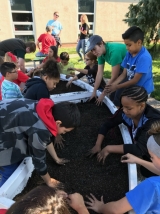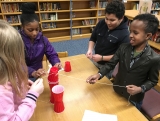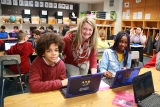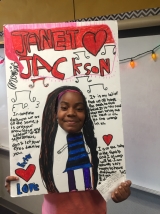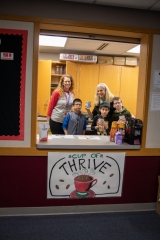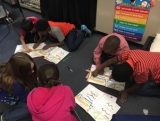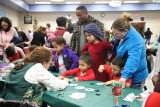-
Category 3
Selected in 2020
-
Grades: k - 6
School Setting: urban
Town Population: 876,862
Student Enrollment: 861
Student Demographics:
Black/African American: 33.7%
Teacher/Student Ratio: 1:24
White/Caucasian: 26.7%
Hispanic: 30.4%
Hawaiian/Pacific Islander: 0%
Asian: 1%
Native American: 0.1%
Other: 8.1%
% Reduced Lunch: 80%
% ELL Learners: 22%
Founded: 1958 -
PRINCIPAL:
Jennifer Nichols -
CONTACT:
6740 W Morris St
Indianapolis, IN 46241
317-988-8080
jennifer.nichols@wayne.k12.in.us
McClelland Elementary School
Indianapolis, IN
Wow! This school has such a special feeling!
- Describe specific programs in place to ensure that families are involved in the success of your school and students.
- Family engagement in school activities exceeds our school’s capacity, so many events are conducted at our area high school where we can welcome all. Significant numbers support our robust choir, art club, robotics team, Spell Bowl and Math Bowl teams, ReFit Dance Club, and Girls on the Run . Families assist with maintaining our school learning garden, and flock to Title I events such as Muffins with Moms, Doughnuts with Dudes, STEM Nights, and our annual Winter Learning Land. Families welcome any opportunity to support students by engaging in events such as VIP Day, LAP Family Night, Spring Fling, and quarterly skating parties. It has become an annual tradition for many family members to line up, wrapping around the building, on the first day of school to be a part of our special opening day. Numerous family and community members volunteer weekly for our HOSTS (Helping One Student To Succeed) program and assist with school improvement planning and hiring new staff.
- Describe the most successful activity your school has initiated to strengthen ties to your community.
-
Relationship building has been the key to McClelland Elementary’s growth and success. We are the cornerstone of a tight-knit community on the west side of Indianapolis, Indiana. McClelland is surrounded by multi-generational families who choose to remain in our area to send their children and grandchildren to what we fondly call “The Mac.” We have been intentional about creating opportunities to open our doors and welcome families to meaningful events. Families take pride in being actively involved in their students’ education. We invite them to have lunch with their students and to volunteer in classrooms. We welcome them to participate in the interview process for new teachers. We solicit their input for Title I planning and for enhancing our Social Emotional Learning curriculum. Families feel welcome, valued, and given a voice to guide practices for their children and our school. These partnerships have been transformative for the Mac!
- Describe your philosophy of school change or improvement.
-
McClelland’s philosophy of school change is that adults have to be open to new learning and willing to admit that there is always room for personal growth and reflection. Authentic school change can occur when all stakeholders understand the mission and vision and are selflessly dedicated to fulfilling both. We have a community of adults who are willing to collaborate, learn, grow, and change so that they can better serve students in a way that puts scholars' needs first. We are intentional about setting goals, measuring progress toward them, and adjusting as needed. When we miss our target, we are willing to take a hard look at the practices being used and change adult behavior to better meet the needs of our students. We practice distributive leadership so that all teachers feel valued, connected, and empowered. Our work in the area of growth mindsets for adults has been powerful in helping us better serve our students and families, resulting in improved learning and achievement.
- What are your school’s top two goals for the next year?
-
McClelland Elementary’s staff looks forward to continuing our work on our two long-term School Improvement Goals:
Priority 1: As a result of the implementation of an aligned ELA curriculum with common materials, 100% of students will be able to respond to what they read and support their thinking with relevant text evidence.
Priority 2: As a result of strengthening strategies rooted in positive school discipline, trauma-informed practices, and culturally-responsive practices to improve school climate and academic achievement among all students, out-of-school suspensions will be reduced by 20%.
In addition to these long-term goals, we will be focusing on accelerating learning to overcome the effects of the Coronavirus Pandemic.
- What is the single most important factor in the success of your school that others could replicate?
-
The key to our success is relationships. First and foremost, our relationships with students foster a learning environment where students feel safe, valued, and genuinely cared for as individuals. Students know we are teaching them to be people with good character and integrity and to be critical thinkers who can communicate and solve problems to make our world a better place. Next, the relationships between staff members create a school community that truly feels like one big family. Over the course of many years, our staff has created partnerships with our families and community members. This has been a process that has slowly evolved into authentic care and concern between home and school. We value the time spent with children and their families, and in turn, they love being involved in their children’s school lives. Time together builds trust. Trust opens the door to vulnerability which allows us to address the authentic needs of students, improving outcomes for success.
- Describe the program or initiative that has had the greatest positive effect on student achievement, including closing achievement or opportunity gaps, if applicable.
-
The initiative with the greatest positive effect on student achievement is our McClelland Elementary School Leadership Team. Through team collaboration, we are able to fully implement shared leadership and increase teacher empowerment. Each team member contributes ideas to meet the needs of students, to enhance school-wide practices, and to continue pushing us toward greatness. The leadership team considers academic strategies, professional development pathways, student behavior management and SEL, student events, community outreach events, and the creation of our School Improvement Plan. This team is made up of classroom teachers, special education teachers, our occupational therapist, our staff developer, and special area teachers. With this wide range of expertise, we are able to collaborate around a variety of research-based ideas and make decisions that will be most effective in meeting the needs of our learners, promoting the growth mindsets of staff, and engaging our families.
- Explain how ESEA federal funds are used to support your improvement efforts.
-
ESEA funds are used to pay salaries for McClelland's Title I teachers and Parent Liaison. In addition, we use ESEA funds to provide family events such as Title I Parent Night, Family STEM Night, Muffins with Moms, Doughnuts with Dudes, and Winter Learning Land. ESEA funds provide books and periodicals for students and to purchase books for staff book studies and professional development sessions. We also purchase books and resources to share with parents to help support their work with their scholars at home. We provide book distributions for students to keep at home and add to their own libraries over each fall, winter, and spring break. During the summer months we provide weekly distributions of books to students. These are distributed at school and at a large apartment community where summer lunch is set up for students multiple times per week. Multiple staff members volunteer to supervise the book distribution so we can stay connected to students when school is not in session.
- Identify the critical professional development activities you use to improve teaching and student learning.
-
Professional development experiences are driven by the specific needs of teachers. We structure our professional learning opportunities to allow for teacher voice, choice, and leadership.
These have included:
Critical Thinking Professional Development with a year-long focus on defining critical thinking at McClelland and creating teacher-made rubrics that measured student’s critical thinking behaviors.
Instructional Rounding: Teachers participated in a year-long study focused on a problem of practice (or within instruction), then participated in year-long professional development to learn strategies that could support student learning within this problem of practice.
Individual Coaching Cycles: Coaching cycles are used for teachers who want to work alongside their instructional coach, to focus on an area of need, co-plan, co-teach, assess, and reflect.
Many grade teams and individuals like this method of on-demand PD and find great value in their learning.
- Describe how data is used to improve student achievement and inform decision making.
- We utilize quarterly Title I team and classroom teacher data discussions along with the Responsive Instructional Cycle. We administer pre and post-unit assessments and discuss data as grade-level teams. These teams are made up of classroom teachers, special education teachers, Title I teachers, and English as New Language teachers. Collaboration leads to identifying resources and planning for differentiated instruction. Our teachers use a wide range of ways to collect classroom data, including unit tests, quick checks, exit slips, and observations to intervene early and meet the needs of our scholars. This data helps to drive instruction within the classroom, small groups, and pull out services. Our RtI team meets weekly to set goals for students and to plan for instruction to enhance learning. We maintain high expectations for scholars and provide the support they need to achieve success. We take pride in creative planning and implementation to accelerate learning for optimal growth.
- Describe your school culture and explain changes you’ve taken to improve it.
-
At McClelland Elementary we often hear, “Wow! This school has such a special feeling!” It is the loving, welcoming, and nurturing culture that visitors feel when they enter our doors. Our culture is centered around the belief that all students can achieve at their highest potential when they feel accepted, valued, and empowered. We are quite diverse in cultural backgrounds and learning needs, and students learn right away to find value and beauty in our differences. Our work in the area of SEL has created an environment where children and adults understand the power of vulnerability and willingness to communicate and strengthen relationships. Adults regularly model empathy, how to peacefully problem solve, and how to restore relationships when someone has been wronged. We avoid being consequence-driven and we focus on finding lasting solutions to problems. This work takes time and adults who are willing to put in the work to transform their practices and classroom communities.
Stats
-
Category 3
Selected in 2020
-
Grades: k - 6
School Setting: urban
Town Population: 876,862
Student Enrollment: 861
Student Demographics:
Black/African American: 33.7%
Teacher/Student Ratio: 1:24
White/Caucasian: 26.7%
Hispanic: 30.4%
Hawaiian/Pacific Islander: 0%
Asian: 1%
Native American: 0.1%
Other: 8.1%
% Reduced Lunch: 80%
% ELL Learners: 22%
Founded: 1958 -
PRINCIPAL:
Jennifer Nichols -
CONTACT:
6740 W Morris St
Indianapolis, IN 46241
317-988-8080
jennifer.nichols@wayne.k12.in.us


